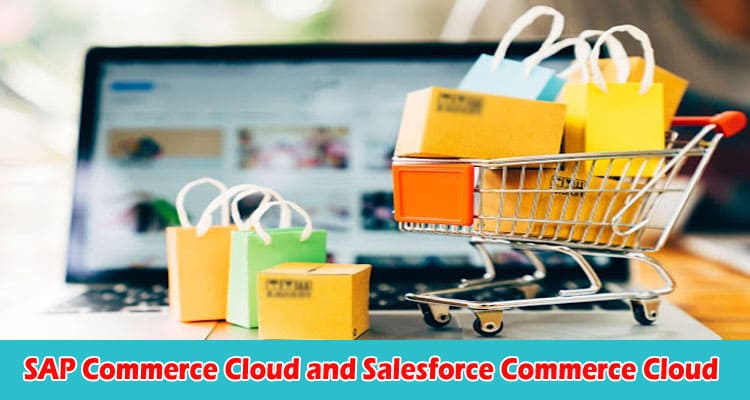The digital environment has started a new era of business management. While giving access to a broad audience and unlimited development opportunities, it also creates a high level of competitiveness, which motivates companies to look for solutions to enhance their functioning. The two most widely used platforms acquired by businesses are SAP Commerce Cloud and Salesforce Commerce Cloud, which provide its clients with a wide range of features and tools.
Both solutions are big players in the modern e-market, leveraging the E-commerce performance. Let’s explore what features they offer to every client.
What is SAP Commerce Cloud?
SAP Commerce Cloud, formerly SAP Hybris, is a cloud-native e-commerce solution widely used by B2B, B2C, and B2B2C business structures. SAP Commerce Cloud includes customer relationship management (CRM), order management, product data management, and shipping.
SAP Commerce Cloud enables customer interaction through various sales channels like e-shops, stores, mobile devices, mailing, call centers, etc. According to LeverX, a global SAP supplier, SAP Commerce Cloud is an efficient solution for small and medium-sized businesses that aim to manage sales and customer relationships and for big companies that want to extend their commerce potential without investing in new software.
The efficiency of SAP solutions depends on its developers’ skillfulness and expertise. Therefore, cooperating with companies like LeverX, whose proven track of successful projects makes them the leaders of SAP services on the market, is worth your investment.
The main features of SAP Commerce Cloud (SAP CC)
- Service-oriented architecture — SAP CC uses various software components and services to create separate business applications. While each service is responsible for a particular area of business performance, they can easily communicate with each other across platforms.
- Modular structure — SAP CC can function as a standalone application. However, depending on the business requests, it can also be co-integrated with other solutions.
- Multi-channel performance — SAP CC provides a personalized customer experience across various channels of sale, including web, mobile, and physical stores.
Advantages of SAP Commerce Cloud
- Extensibility and customization
SAP is a highly customizable e-commerce solution that allows clients to choose the modules according to their business needs without disrupting the primary system.
- B2B capabilities
Personalized catalogs, multi-channel sales, and various pricing policies — SAP Commerce Cloud can handle complex requirements regarding B2B functioning.
- Integration
Due to a service-oriented architecture, the integration with other applications, systems, and modules is performed seamlessly without losing data. SAP CC can be combined with SAP Warehouse management solution, giving businesses a better overview of their functioning.
Best cases for usage — complex E-commerce of B2B type, enterprise extension (provided by modular structure), multi-channel sales management.
What Is Salesforce Commerce Cloud?
Salesforce Commerce Cloud is a commerce platform that aims to automate business commerce processes, improve customer experience, and thus increase sales and business performance. Its platform is tailored according to the specific needs of every customer, helping to manage orders and customer experiences and receive all the data regarding the product and its movement to the customer. Salesforce Commerce Cloud can be integrated with other sub-applications — marketing automation and contact management, which help to manage the sales process from one platform.
The main features of Salesforce Commerce Cloud (SFCC)
- Microservice architecture — SFCC employs the structure where the application is developed as a set of services. It allows its framework to develop, deploy, and maintain services independently, extending flexibility levels.
- Headless commerce — SFCC E-commerce platform doesn’t have a ‘head’ – user interface, as the front and back-end are separated. Such an approach provides better customization options and flexibility when enhancing user experiences.
- API-first approach — well-documented APIs offer seamless integration with third-party applications, letting the business extend the level of management and control.
Advantages of Salesforce Commerce Cloud
- Scalability — the microservice architecture provides easy scalability, with an ability to deal with high traffic and complex business requests.
- Customization — the headless nature of SFCC offers its users more possibilities to customize and personalize the customer experience.
- Integration — the API-first approach enables trouble-free integration with other systems and applications.
The best cases for usage are:
- Rapid launch (due to industry-specific templates).
- Large enterprises with high transaction volumes.
- Integrations with the Salesforce ecosystem.
The Bottom Line
Selection of the right E-commerce platform is crucial for the successful functioning of any online business. SAP Commerce Cloud and Salesforce Commerce Cloud are somewhat similar leading competitors. However, they are based on different approaches to business management.
When considering the right solution, it is essential to check if their characteristics align with the business needs. Don’t hesitate to contact the LeverX specialists, who can advise from a professional point of view, considering all your requirements.







